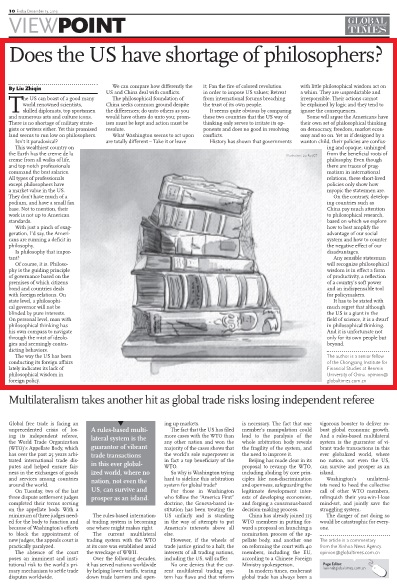Major Power Relations
Your Present Location: PROGRAMS> Major Power RelationsLiu Zhiqin: Does the US have shortage of philosophers?
By Liu Zhiqin Source: Global Times Published: 2019-12-13

The US can boast of a good many world renowned scientists, skilled diplomats, top sportsmen and numerous arts and culture icons. There is no shortage of military strategists or writers either. Yet this promised land seems to run low on philosophers.
Isn't it paradoxical?
This wealthiest country on the Earth has the creme de la creme from all walks of life, and top notch professionals command the best salaries. All types of professionals except philosophers have a market value in the US. They don't have much of a podium, and have a small fan base. Not to mention, their work is not up to American standards.
With just a pinch of exaggeration, I'd say, the Americans are running a deficit in philosophy.
Is philosophy that important?
Of course, it is. Philosophy is the guiding principle of governance based on the premises of which citizens bond and countries deals with foreign relations. On state level, a philosophical governor will not be blinded by pure interests. On personal level, man with philosophical thinking has his own compass to navigate through the mist of ideologies and seemingly contradicting behaviors.
The way the US has been conducting its foreign affairs lately indicates its lack of philosophical wisdom in foreign policy.
We can compare how differently the US and China deal with conflicts.
The philosophical foundation of China seeks common ground despite the differences; do unto others as you would have others do unto you; promises must be kept and action must be resolute.
What Washington seems to act upon are totally different - Take it or leave it; Fan the fire of colored revolution in order to impose US values; Retreat from international forums breaching the trust of its own people.
It seems quite obvious by comparing these two countries that the US way of thinking only serves to irritate its opponents and does no good in resolving conflicts.
History has shown that governments with little philosophical wisdom act on a whim. They are unpredictable and irresponsible. Their actions cannot be explained by logic and they tend to ignore the consequences.
Some will argue the Americans have their own set of philosophical thinking on democracy, freedom, market economy and so on. Yet as if designed by a wanton child, their policies are confusing and opaque, unhinged from the beneficial roots of philosophy. Even though there are traces of pragmatism in international relations, these short-lived policies only show how myopic the statesmen are.
On the contrary, developing countries such as China pay much attention to philosophical research, based on which we explore how to best amplify the advantage of our social system and how to counter the negative effect of our disadvantages.
Any sensible statesman will recognize philosophical wisdom is in effect a form of productivity, a reflection of a country's soft power and an indispensable tool for policymakers.
It has to be stated with much regret that although the US is a giant in the field of science, it is a dwarf in philosophical thinking. And it is unfortunate not only for its own people but beyond.
The author is a senior fellow of the Chongyang Institute for Financial Studies at Renmin University of China.























































































 京公网安备 11010802037854号
京公网安备 11010802037854号





